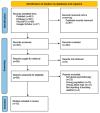Best Practices for Teaching Psychotherapy to Medical Students: A Scoping Review
- PMID: 40564562
- PMCID: PMC12189545
- DOI: 10.3390/bs15060780
Best Practices for Teaching Psychotherapy to Medical Students: A Scoping Review
Abstract
Psychotherapy is an essential component of mental healthcare, yet its formal instruction within medical curricula remains underdeveloped. This scoping review aimed to map the best practices for teaching psychotherapy to medical students by examining the types of psychotherapy covered and the teaching strategies employed. A systematic search was conducted across the PubMed, Embase, PsycINFO and Google Scholar databases without time restrictions, and studies were selected if they focused on psychotherapy education for medical students. Fifteen studies met the inclusion criteria. The findings revealed that multimodal approaches, combining didactic sessions, experiential learning, clinical exposure and digital content, were the most commonly used and pedagogically effective strategies. Role play and clinical exposition were particularly valued for enhancing communication skills, empathy and therapeutic understanding, while e-learning emerged as a flexible but less frequently used tool. Motivational interviewing was the most frequently taught psychotherapeutic modality, followed by mindfulness, cognitive-behavioral therapy and psychodynamic approaches. Although the overall quality of studies was moderate to high, the heterogeneity in study design and outcome measures limited direct comparisons. These results highlight the need for standardized, experiential and integrated teaching strategies to better prepare future physicians for incorporating psychotherapy principles into clinical practice.
Keywords: clinical exposition; curriculum development; e-learning; experiential learning; medical education; medical students; motivational interviewing; psychiatry teaching; psychotherapy education; role play.
Conflict of interest statement
The authors declare no conflicts of interest.
Figures
References
-
- Chéret A., Durier C., Noël N., Bourdic K., Legrand C., D’Andréa C., Hem E., Goujard C., Berthiaume P., Consoli S. M. Motivational interviewing training for medical students: A pilot pre-post feasibility study. Patient Education and Counseling. 2018;101(11):1934–1941. doi: 10.1016/j.pec.2018.06.011. - DOI - PubMed
Publication types
LinkOut - more resources
Full Text Sources
Miscellaneous


